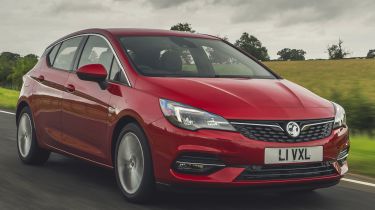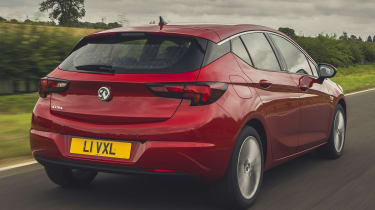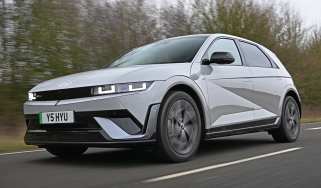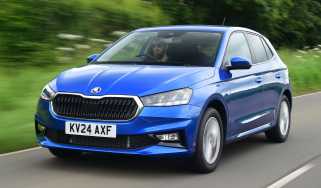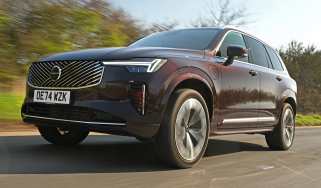Vauxhall Astra hatchback review (2015-2021)
"This Vauxhall Astra is the best yet. It combines efficient engines, an enjoyable driving experience and a stylish design to make it one of the best family hatchbacks on sale"
Pros
- Frugal engines
- Lots of technology
- Good to drive
Cons
- Less desirable than a Golf
- Rivals have longer warranties
- Residual values not the best
Despite strong sales over the years, the Vauxhall Astra has never come in for much praise, perhaps in part because the brand suffers from a lack of desirability. Vauxhall has done everything it can to mitigate this with the latest version of the Astra, making a determined effort to put the car firmly at the top of the hatchback class where its merits can't be overlooked.
 The 10 best hatchbacks to buy in 2025
The 10 best hatchbacks to buy in 2025
The new and old Vauxhall Astra look fairly similar, but parked side-by-side it’s clear the latest car is leaner and lighter on its feet. The changes continue under the metal, with more efficient engines and a reworked chassis that narrows the gap to the Ford Focus and Volkswagen Golf for keen drivers.
The Astra was facelifted again in 2019, but its exterior appearance was left mostly alone, save for a drop in ride height and tweaked lights and bumpers. A ride height reduction of 10mm and other tweaks improved the car’s aerodynamics, while the range of engines and gearboxes on offer was completely changed.
In terms of value and comfort, it gives no quarter to the Renault Megane, SEAT Leon, Hyundai i30 or Kia Ceed, either. There’s more space inside than ever before, too. Its lighter appearance is no illusion – the latest Astra is actually 200kg lighter than the old model, contributing to dramatic improvements in fuel economy along with better performance.
The engine range is wide and features several petrols and diesels. As is increasingly the practice, all have three cylinders and a turbocharger, for greater power and economy. The smallest turbo petrol is the 108bhp 1.2-litre, a modern and efficient engine that can return up to 54.3mpg and emits from 119g/km of CO2, for a low BiK rate for company-car drivers.
More reviews
Moving up the engine range, there are two more powerful versions of the 1.2-litre turbo petrol, producing 128bhp and 143bhp. Somewhat confusingly, Vauxhall also used to offer a 1.4-litre with an identical 143bhp that came fitted with a 'stepless' CVT automatic gearbox as standard, but this has been discontinued.
Naturally, the diesels have the best economy and emissions figures but they’re all pretty sprightly, too. Even the least powerful, economy-orientated 104bhp 1.5-litre Turbo D engine can get from 0-62mph in 10.2 seconds, yet returns up to 65.7mpg. The other diesel engine produces 120bhp and returns almost the same economy, or up to 56.5mpg when a new nine-speed automatic gearbox is fitted.
The quality of some interior materials might not topple the Volkswagen Golf, but the Astra’s dashboard feels much more contemporary and logical than the previous model and the standard ‘IntelliLink’ infotainment system gives in-car technology a real boost, with far fewer fiddly buttons than in previous Astras. The facelift improved it again, with more soft-touch plastics dotted around the interior and a new eight-inch touchscreen. There’s plenty of interior space, too; boot capacity is only 10 litres shy of the VW Golf.
Vauxhall has honed the Astra’s suspension on UK roads and you can tell. There’s a great compromise between ride comfort and driving pleasure. Poor roads and potholes won’t jar occupants too badly, but the suspension doesn’t sag or lean in sharp corners. The Focus just has the edge for pure driving fun, but the Astra is very happy whether it’s on a twisty country lane or the M6 motorway, making it a great all-rounder.
There are now four trim levels (reduced from seven earlier in 2020) but, even so, most will find a specification to suit. The range opens with Business Edition Nav followed by SRi Nav, Griffin Edition and Elite Nav Premium, with every Astra getting essentials like air-conditioning, a touchscreen, Bluetooth, cruise control and DAB radio as standard. SRi models have a sportier theme.
The Elite Nav Premium trim is designed with luxury and convenience in mind, offering executive must-haves like leather upholstery, heated seats and even a heated steering wheel. There's also an eight-inch infotainment system with sat nav and an eight-inch digital instrument cluster.
The Astra should certainly protect occupants well in an accident, with a five-star crash safety rating from Euro NCAP. And all the changes mentioned above seem to have paid off; the Vauxhall Astra improved its position in our 2020 Driver Power owner satisfaction survey of cars currently on sale in the UK from 75th last year to 59th this year, out of the 75 cars ranked. Vauxhall still finished 29th out of 30 manufacturers ranked, however.
While the Astra’s popularity on company-car lists and rental fleets might have tarnished its desirability somewhat, the latest version has come on leaps and bounds. It’s very quiet on the move and feels comfortable without losing out too much in the handling stakes. Owners also told us the Astra is admirably affordable to run.

